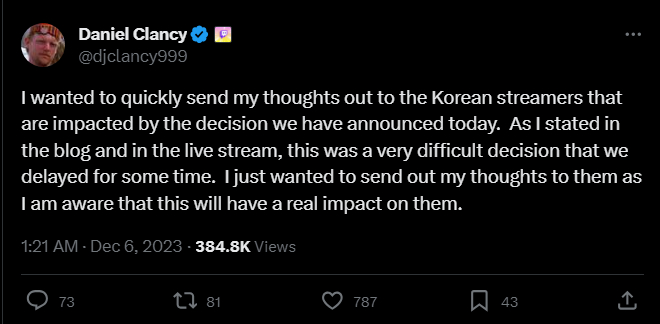Twitch is shuttering its services in South Korea next year, claiming network fees are '10 times more expensive than in most other countries'
"Unfortunately there is no pathway forward for our business to run more sustainably in that country."

Twitch has announced it's pulling its service from South Korea in less than three months, citing high operation costs as the reason why.
In a blog post on its website, CEO Dan Clancy offered an explanation to the shutdown: "Ultimately, the cost to operate Twitch in Korea is prohibitively expensive and we have spent significant effort working to reduce these costs so that we could find a way for the Twitch business to remain in Korea."
Clancy goes on to say that despite reducing maximum source quality to 720p and experimenting with a peer-to-peer model, "our network fees in Korea are still 10 times more expensive than in most other countries. Twitch has been operating in Korea at a significant loss, and unfortunately there is no pathway forward for our business to run more sustainably in that country."
The high fees come from South Korea's law that dictates content providers have to pay volume-dependent fees in order to deliver their digital goodies through Korean internet service providers. It's proven a hot topic in the country over the last few years especially as it targets high-bandwidth sites like Google and Netflix, with the latter previously embroiled in a lawsuit with one of South Korea's biggest providers over who should foot the bill.
The introduction of the law saw Twitch trying to dampen those costs in recent months. November 2022 saw the site terminate its VOD service for South Korean creators, a decision that came four months after downgrading the streaming quality to 720p. Both moves proved controversial among both Korean and international viewers, with many expressing concern back then that it was the writing on the wall for the site's presence in South Korea.

While Twitch doesn't appear to have been South Korea's largest gaming streaming site, it was certainly up there along with YouTube Gaming and domestic site AfreecaTV. Clancy claims that Twitch will assist Korean streamers in migrating their community to another streaming site, saying that Twitch is "reaching out to several of these services to help with the transition and will communicate with impacted streamers as those discussions progress."
It's a huge blow to Korean streamers, viewers and international enjoyers of South Korean creators. MunchkinJesse, who has lived in Korea for 10 years and streamed on Twitch for six, tweeted a screenshotted statement from her Discord server: "I am beyond heartbroken to lose the channel I spent the last 6 years building. The news still hasn't fully hit me yet, and feels like a very bad dream. I'm doing my best to try and keep my head above the water so we can figure out where to go from here and keep the community together."
Keep up to date with the most important stories and the best deals, as picked by the PC Gamer team.
Viewers in Korea will no longer be able to make any purchases—such as subscriptions and bits—from February 27, 2024. Final payouts will go to Korean streamers on March 16, 2024, with affiliates and partners being offboarded on June 4, 2024.

Mollie spent her early childhood deeply invested in games like Killer Instinct, Toontown and Audition Online, which continue to form the pillars of her personality today. She joined PC Gamer in 2020 as a news writer and now lends her expertise to write a wealth of features, guides and reviews with a dash of chaos. She can often be found causing mischief in Final Fantasy 14, using those experiences to write neat things about her favourite MMO. When she's not staring at her bunny girl she can be found sweating out rhythm games, pretending to be good at fighting games or spending far too much money at her local arcade.

